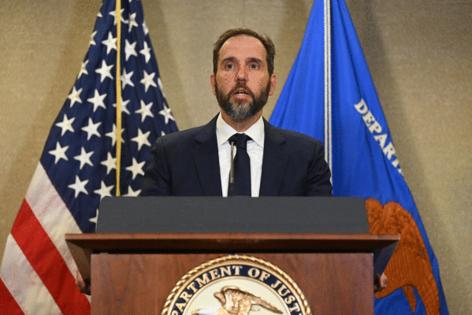US judge in Florida blocks special counsel's Trump report
Published in Political News
WASHINGTON — A federal judge in Florida blocked the Justice Department from releasing a report on two criminal probes of Donald Trump, setting up a potential legal fight between the president-elect and the prosecutors that investigated him.
U.S. District Judge Aileen Cannon said she was temporarily prohibiting public release of the findings of special counsel Jack Smith‘s investigations into Trump. It’s unclear if Cannon has the authority to prevent the report’s release, which is expected before Trump’s inauguration Jan. 20.
Smith charged Trump with illegally conspiring to overturn the 2020 election and with mishandling sensitive national security information after he left office, but dropped the cases following Trump’s election in November. The president-elect is seeking to prevent release of the final report.
Trump told reporters at a press conference in Florida on Tuesday that he expects Smith’s filing to be “a fake report,” alleging that the case was politically motivated and had been dismissed by Cannon.
Cannon issued an order Tuesday that would block public release of the report pending a resolution on how to handle the matter from the 11th U.S. Circuit Court of Appeals.
The appeals court has ordered Smith to respond by Wednesday morning. Smith’s office declined to comment on the developments, but in a filing late Tuesday said the response will be made to the appeals court and not to Cannon.
Controversial Ruling
In one of the cases, Smith secured indictments of Trump and two of his associates, Walt Nauta and Carlos De Oliveira, for actions related to the alleged mishandling of classified documents and obstruction of justice. In the other case, Smith charged Trump over his efforts to try to overturn the results of the 2020 election in which he lost to President Joe Biden.
Cannon issued a controversial ruling dismissing Smith’s classified documents case against Trump and his co-defendants last year, claiming that Smith’s appointment was unconstitutional.
It isn’t clear if Cannon has the authority to prevent the Justice Department from releasing either section of the report, especially the section dealing with the election interference case, since it was never before her and is no longer active.
But lawyers for Trump argued in their legal filing that the report on election interference should be blocked from release because evidence and witness testimony contained in it overlaps with the prosecution of the documents case.
Former federal prosecutor Barbara McQuade said on MSNBC during an interview Tuesday that “Judge Cannon does not have jurisdiction” over Smith’s cases but “the name of the game is delay.”
May Delay Release
While Cannon’s order might not be enforceable, it could cause the department to delay public release of Smith’s report as federal prosecutors work through their response.
Michael Gerhardt, a law professor at the University of North Carolina at Chapel Hill, said Cannon lacks jurisdiction over the matter because the case is technically no longer before her and that release of the report is done pursuant to the Justice Department’s internal policy.
“She cannot, on her own, simply reach out to tell the Justice Department what it may and may not do with its reports,” Gerhardt said.
Nauta and De Oliveira filed emergency motions with Cannon and the 11th U.S. Circuit Court of Appeals seeking orders to prevent Smith, Garland or anyone at the Justice Department from releasing Smith’s final report, saying it was their understanding that the report could be made public as early as Friday.
In an updated filing later Tuesday, Nauta and De Oliveira asked the appeals court to let Cannon make the final decision on what to do about the report, meaning no ruling from the higher court would be necessary.
Trump made a legal filing Tuesday asking Cannon for permission to join the emergency motion.
‘Irreparable Harm’
Cannon said the order blocking release of Smith’s report is necessary “to prevent irreparable harm” to Trump and two associates until the court of appeals decides what to do.
The matter is legally murky and complicated for several reasons. For example, Smith dropped both cases against Trump after he was elected president, citing Justice Department policy that prohibits prosecution of a sitting president.
Cannon also previously dismissed the case against Trump, Nauta and De Oliveira on grounds that Smith was illegally appointed. The Justice Department has appealed Cannon’s ruling to the 11th Circuit, saying it still wants to prosecute Nauta and De Oliveira.
Smith’s office told Trump’s lawyers they oppose his request to intervene in the matter and that there is no emergency that needs to addressed, according to an email provided in Trump’s legal filing. Smith’s office said it would notify Trump of a decision to make the final report public and give him an opportunity to take appropriate legal action.
----------
With assistance from Sabrina Willmer.
©2025 Bloomberg L.P. Visit bloomberg.com. Distributed by Tribune Content Agency, LLC.




























































Comments